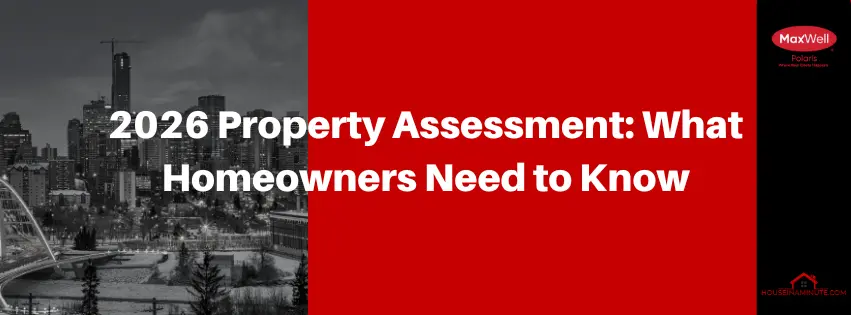Edmonton's 2026 Property Assessment: What Homeowners Need to Know
Hey there, Edmonton homeowners! If you’ve ever opened your mailbox and found that annual property assessment notice, you know it can bring up a mix of curiosity and maybe a little worry. That envelope means something real for your property taxes, and with the 2026 assessment cycle around the corner, it’s a good idea to know what’s new, how it might affect your tax bill, and where you can go for help if you need it.
Let’s chat about what’s going on with property assessments in Edmonton this year. We’ll take a look at what assessments are, what’s changing for the 2026 cycle, and a few practical tips to help you stay in the loop. By the end, you’ll have a better handle on your assessment notice—and hopefully a bit more confidence when that envelope arrives.
What is a Property Assessment?
So, what exactly is a property assessment? In Edmonton, it’s the City’s way of putting a value on your home—more specifically, what it probably would have sold for as of July 1 of the previous year. Don’t confuse this with your purchase price or what your neighbor’s house just sold for this month; it's a snapshot meant to help the City share out the property tax bill fairly.
Each year, the City reassesses every property (that’s nearly 400,000 homes!) to figure out how the tax pie gets sliced up.
Here’s how the City usually comes up with your value:
- Location: Is your neighborhood in-demand? Close to parks, schools, or anything that makes it a hotspot?
- Size and Age: How big is your home and lot? How old is the house?
- Features: Things like garages, finished basements, or extra bathrooms get considered.
- Condition: Is your house newly renovated or in need of some TLC?
- Upgrades: Renovations, energy-efficient upgrades, and even landscaping can bump up your value.
Assessors use mass appraisal, which means they look at groups of similar homes and recent sale prices to figure out market value. This way, everyone’s on a level playing field.
If you want more specifics on your own property, you can always hop on MyProperty—an online tool that lets you check your assessment and compare it with similar homes in your area. Seriously, it's worth a look!
Key Changes in the 2026 Cycle
So, what’s new this year? For 2026, the City is focusing even more closely on neighborhood trends and recent sales. That means, if there’s been a price jump (or drop) where you live, you’ll probably see that reflected in your new assessment pretty quickly.
Plus, features like energy-smart upgrades and legal suites are getting more attention—these are showing up more in recent home sales, so assessors want to keep things fair for everyone. And don’t forget, other things like landscaping or finished basements matter too. Bottom line: even if you haven’t changed a thing, your assessment might shift based on what’s happening in your neighborhood.
When you get your notice (usually in January), take a look at all the details. If something looks off—maybe square footage is wrong, or a renovation wasn’t included—it could change your property’s assessed value. You’re encouraged to double-check things, and reach out if you have questions. The City’s experts are super helpful, and you can start online or give them a call at 311 (or 780-442-5311 outside Edmonton).
How Assessments Impact Your Property Taxes
Let’s clear up a major myth: if your assessment goes up, your property taxes will go up too. That’s not always the case! Your taxes are calculated like this:
Assessed Value × Tax Rate = Property Taxes
The tax rate is set by City Council each spring, based on Edmonton’s budget. That means, sometimes your assessment might rise, but if everyone’s does, your share may stay about the same. Here’s when your bill could change:
- Budget changes: If the City needs more money for services, everyone pays a bit more.
- Your assessment vs. the average: If your value climbs more than most, your taxes might go up. If it rises less than average, you could see a smaller increase—or even a decrease.
You can use the City's Property Tax Estimator to get a ballpark of what you'll owe if you want to play around with the numbers.
Tips for Edmonton Homeowners
With the 2026 property assessment notices coming up, here are steps you can take to make sure your assessment is accurate and fair:
1. Review Your Assessment Details
When you receive your notice, check every detail—square footage, year built, upgrades, all of it. If anything looks wrong, hop on MyProperty or get in touch with the City. Having accurate info helps protect your wallet!
2. Compare to Similar Properties
Did you know you can look up assessments for other homes in your neighborhood on the City website? Use this to see if your value is in line with others nearby. It’s a great way to spot mistakes, or just reassure yourself that you’re not way off base.
3. Know How to Appeal
If something doesn’t add up, you can appeal. Be ready with proof—like examples of similar homes or records of your property’s condition. There’s a deadline (usually 60 days from the notice mailout), so don’t wait! More info on appeals is here.
4. Keep Your Records Handy
If you’ve done renovations or major repairs (or haven’t!), keep your receipts and photos. These can make a difference if you ever need to dispute your assessment.
5. Ask for Help if You Need It
Not sure about something? The City’s property assessment experts are there to support you, and reaching out doesn’t cost a thing (no formal complaint fees just to speak with someone). You can call 311, email, or start online. Have your assessment notice handy to keep things moving quickly.
Stay Informed and Proactive
The 2026 assessment changes might mean bigger swings for some neighborhoods, so it pays to be proactive. By reviewing your notice carefully and taking advantage of the City’s online tools, you’ll be in a better spot—no surprises, just knowledge.
Want more info or need helpful links and forms? Everything you need is at www.edmonton.ca/assessment. You’ll find the MyProperty portal, FAQs, deadline reminders, and even how to update your records if you move.
And if all else fails or you hit a snag, just call 311—they’re there to help you out.
Stay informed, keep your records up to date, and don’t hesitate to ask questions. Understanding how assessments work means fewer surprises—and maybe even a friendlier property tax bill.
Posted by Admin . on

Leave A Comment